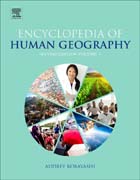
The interactions of humans with their changing environment is the main objective of the study of human geography. The interests of geographers range widely, but their perspective addresses the significance of place, spatiality, and landscape as the settings in which humans live. This outstanding reference work is the most comprehensive, up-to-date, and in-depth coverage of the discipline. Its sources are authoritative and international, and represent a critical overview of the range of issues that human geographers address, of the methods they use in their research, and of the relevance of human geography to the world. Since publication of the International Encyclopedia of Human Geography in 2009 much has changed in the field. Our world is more diverse, multicultural, and multinational. The new edition embraces this diversity by design, and captures the ways in which humans share places, as well as the differences - according to gender, race, nationality, location and other factors - that make people and places different. Questions of, for example, politics, economics, race relations, and migration, are introduced and discussed through a geographical lens. The first edition was celebrated as providing an authoritative overview of all aspects of the field, covering wide-ranging topics across social sciences. The second edition sees an enhanced focus on key areas such as population, nature/environment and social, cultural and political geography. Once again it will assist the audience in their research by providing factual information, historical perspective, theoretical approaches, reviews of the literature, and provocative topical discussion to stimulate creative thinking. Ultimately, this second edition will ensure readers gain a better understanding of the issues of a diverse world via the tools of human geography. The International Encyclopedia of Human Geography, Second Edition, is an easily accessible, interdisciplinary and fully comprehensive source of information in what is a fascinating discipline of social science, and is essential reading for students, researchers, members of the media and public policy analysts interested in this subject. The most up-to-date and comprehensive coverage of human geography in one placeExtensive scope and depth of coverageEmphasis on how geographers interact with, understand, and contribute to problem solving in the contemporary world and contemporary social problemsEmphasis on how geography is relevant in a social and interdisciplinary context INDICE: The second edition contains approximately 800 articles which are structured around the following themes: Cultural: Topics include: cultural geography; cultural theory; cultural studies; postcolonial geographies; indigenous geographies; education; ethnicity; geography and religion; geography and the humanities; geography and the media (film, print, creative industries); popular culture; more-than-human representations Economic: Topics include: economic development; economic theories; spatial theories; urban economic geography; economic inequalities; housing; industrial geography; geographies of labor and job provision; transportation and communication; technology; world trade and trade policies; modernization and global economies; neoliberalism Historical: Topics include: Landscape development; Historical representations/re-presentations/more-than-representations; Histories of the discipline; Historical geographies of political/conflict/border-making events; Historical GIS; Institutional historical geographies; Political economies; Colonialism and imperialism Health: Topics include: health geography; medical geography; geographies of care; emotional geographies/geographies of mental health; therapeutic places; health care systems and institutions; healthcare policies; critical disability studies; epidemics and pandemics; international health aid; health and development; health and the built environment Methods: Topics include: Cartography; methodology/paradigms; digital technologies; quantitative methods; qualitative methods; ethics and methods; surveys; GIS; participatory research Nature/Society: Topics include: theories of nature; human/society and nature relations; climate change; natural disasters; energy issues; rural geographies; recreational geographies; non-human geographies; Anthropocene; environmental racism Political/Philosophy: Topics include: Geopolitics; human rights; neoliberalism; political theory; international security; borders and boundaries; electoral geographies; public policy; governance; peace and conflict; politics of religion; political migration; international relations; international conventions; electoral geography Population: Topics include: population growth and distribution; demographic change; digital technologies for population representation; migration; refugees; population and development; population and warfare/religion/governance; geographies of aging; globalization; racialization; gender Social: Topics include: social relations; difference; multiculturalism; race and racism; feminist geographies; radical geographies; relevance and social issues; urban social geography; social theories; housing and social services Urban: Topics include: What is urban?; urban historical geography; urban ecology; crime and policing; residential development, including segregation; urban models
- ISBN: 978-0-08-102295-5
- Editorial: Elsevier
- Encuadernacion: Cartoné
- Páginas: 9100
- Fecha Publicación: 02/12/2019
- Nº Volúmenes: 1
- Idioma: Inglés
